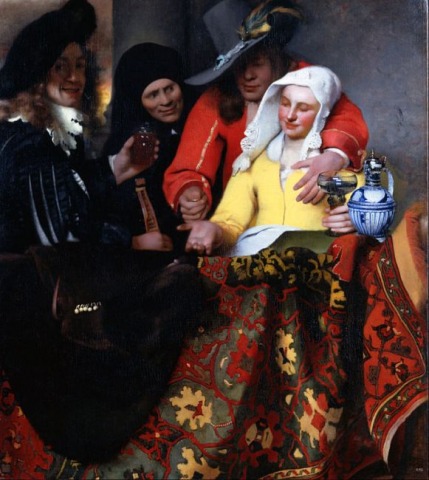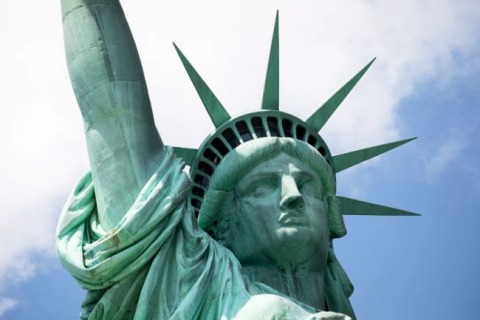
The Underground Thomist
Blog
Novelists as PimpsMonday, 01-10-2022
In hell, Francesca da Rimini tells Dante of the moment of her downfall. She and her brother-in-law Paolo, who were already attracted to each other, were enjoying what used to be called “the near approach of sin” by reading to each other a romance about the adultery of Lancelot and Guinevere. Upon reaching a certain passage, they went up in flames. In hell, she mourns, “A pander was that author, and his book!” It’s interesting to see how difficult some writers and reviewers find it to admit the nature of the sin. For example, one online discussion page says Francesca and Paolo were “innocently” reading the book together. I’m surprised that Canto 4 hasn’t yet been purged from our copies of Dante’s Inferno. Censorious editors sometimes used to expurgate passages in books that were morally objectionable; it was called bowdlerizing. Now they expurgate or change passages that aren’t objectionable enough. In one conspicuous example, Hollywood changed the ending of Hawthorne’s Scarlet Letter so that the adulterers enjoy a happy ending. Francesca was making excuses for herself, but she was also onto something. Recently an Op-Ed columnist whom I occasionally read in the Wall Street Journal took time off from political commentary to praise the depiction of James Bond, the ultimate objectifier of women, because he is always a “gentleman.” I suppose this was because the fine fellow dressed so well and drank his gin so elegantly before bedding the women he called by filthy names, or perhaps because Miss Galore stops resisting after he throws her down and forces himself on her. A few years ago, a book reviewer in the same formerly-staid publication unabashedly praised another work of speculative fiction for having lots of good sex. What struck me wasn’t simply that prurient matter which would once have been condemned is now treated as delightful. In our age, one expects that. No, the surprising thing was that the reviewer presented authorial laziness and crudity as marks of literary skill. Silly me, I thought laziness and crudity marked lack of skill. Talented writers depend on plot and character to hold the attention of their readers, not on sheer sexual arousal. Of course real people, and by extension fictional people, do at times get into bed together! But if the fact that the characters are sexually involved is necessary to the story, even so the physiological and anatomical details may be left offstage, thank you. One formula that sells a lot of books is to present the male lead as having a history of indiscriminate and almost anonymous sex, and yet capable of caring for the female lead so deeply that he would die for her after their one-night stand. “Even after having all those others, I am the one he chose.” The former specification pleases randy male readers, who put themselves in his place. The latter pleases female readers, who even in these crass times want their men to be romantic. No doubt the formula was generated by some marketing algorithm; profit excuses everything. The authors may also be trying to rationalize things about themselves that they might not wish to disclose. Or perhaps they are flattering readers of both sexes who have their own excuses to make. “What’s wrong with that?” I spoke with one author who defended her practice on grounds that if she didn’t put a lot of gratuitous sex into her novels, publishers wouldn’t buy them. What’s wrong with it is that stories written to such formulae are vicious lies. In real life, the two blended character traits are incompatible. The pretense of their compatibility warps the presentation of reality no less, and no less culpably, than the drug dealer who promises ecstasy from chemical enslavement. And the authors know what they are doing. The word “pornography” comes from the combination of the Greek words pornos and graphos, meaning the writing of prostitutes. A better word for much of the novelistic trade today would be "pandography": The writing of panders and pimps.
|
Covid and Civil DisobedienceMonday, 01-03-2022
I received this letter at the beginning of autumn, when the Covid regulatory regime was somewhat stricter. We have had vaccines for some time, the Omicron variant seems much milder, and recovery from it seems to provide some protection against more serious strains. Nevertheless, restrictions are tightening again, so the exchange may still be of interest.
Query:I work at a Catholic diocesan school in a state in which masks must be worn in all schools (including parochial ones). My school is complying and we enforce it as a rule for students. Now, these students have not been wearing masks all summer. They do not wear them during lunch or when outside. I doubt more than a few if any wear them outside of school, where they are not required. Given this, it seems absurd that the masks would have any overall effect on public health. Does that imply that this law is out of accord with reason? Further, is there a greater good in obeying this law because it will allow the school to remain open to provide academic and Catholic education with less difficulty than if the bishop decided to oppose this law? I've told some of my students that we must be willing to suffer for what is good and true, even if we suffer the relatively minor impairment and discomfort of face masks for the sake of school. Yet I can't help but wonder if the better course would be to suffer the fines and legal prosecution rather than accept and promote such an absurd rule. If you have a suggestion on how to resolve this, I'd love to hear it.
Reply:Public authorities have lost so much credibility that mandates are becoming unenforceable, so your problem may not last long. Then again it might, so let’s work through the issues. Surely you’re right that the student masking rule is unlikely to have any effect on the spread of the virus. Moreover, some people have health conditions, such as asthma, which make wearing masks inadvisable. Although some areas with mask mandates allow exemptions for health reasons, others don’t. I suggest that overzealous regulators are motivated not so much by public health as by less creditable desires, such as giving themselves cover when nervous people say they aren’t doing enough. To explain: There are two degrees of severity in unjust laws. Those which are unjust because obeying them would require formal cooperation in moral evil must be disobeyed; for instance, one would have to disobey a command to commit murder. Those which do not require formal cooperation in moral evil yet are nevertheless unjust because (1) they serve private interests rather than the common good, (2) they are made without proper authority, or (3) they violate the formal norms of justice, may be disobeyed – except perhaps when the harm caused by disobedience is even greater. The two kinds of harm which disobedience might cause are scandal, which means acting in such a way as to discredit good behavior (even if unintentionally), and disturbance, which can mean anything from causing riots to causing confusion. So in principle, unjust laws are not true laws at all, but frauds, imposters, phony laws – things that are called laws, but aren’t. However, it doesn’t necessarily follow that I may disobey. One kind of phony law must always be disobeyed; about another kind, one must exercise judgment. Your case, as I think you recognize, would be a type two phony law. I can’t substitute my judgment for yours -- but since you ask, I would say that in your case the burden of wearing the mask is exceeded by the risk of scandal. In fact, the risk of scandal is twofold. One part of the scandal has to do with your teenage students, since teens are not known for discernment, and you don’t want to give them the impression that laws in general do not have to be obeyed. The other part of the scandal -- I think the greater one -- is that the school and the Church might be discredited in the eyes of the public and so become vulnerable to official retaliation. You can imagine how this would go. Those religious nuts won’t obey the law! They don’t care about the spread of disease! Let’s shut down their schools once and for all! It’s also a good idea to remember that even though public policy concerning Covid seems to have been motivated more by panic, desire to look good, and sheer enjoyment in making people do things, than from a genuine and well-grounded concern with public health – still, there is a difference between finding a law unreasonable, and considering it so crazy that no reasonable person could deem it reasonable. For this reason, we should probably require the irrationality of a law to meet some threshold of obvious insanity before we consider disobedience. The more extreme Covid-era restrictions do present occasions for valid civil disobedience – lots of them. For example, if the State tells the Church that she can’t celebrate Mass or hear confessions, the Church should patiently explain the injustice of the commands, but then tell the State “You are free to arrest us if you wish, but we must obey God rather than man.” I wish more of our bishops had been brave enough to act like this -- some were! In my opinion, however, just having to wear a mask in the classroom doesn’t rise to that level. By the way, the risk of scandal is not necessarily fixed. If some teachers in one school disobey the law without explaining their reasons, the scandal is probably great, because they will seem like mere hooligans. If all teachers in all schools disobey the law and fully present their reasons, the risk of scandal may be lessened. That’s the approach Martin Luther King took to the risk of scandal. Rather than saying “If disobedience would gravely risk scandal, then don’t disobey,” he said “See if you can figure out a way to disobey that won’t so gravely risk scandal.” Thus, his protesters announced what they would be doing, did it peacefully, explained why they were doing it, and accepted the legal punishment, showing that they recognized the necessity of law which is truly just. In the case you describe, though, reducing the risk of scandal would be an uphill battle. Why? Because everyone knows that the Church does not possess any special medical expertise. Not only that, the press will inevitably misrepresent her actions. There is such a thing as unavoidable scandal, but this isn’t it. We don’t want her to lose credibility as a teacher of morals and doctrine, which she is qualified to teach, because she is going out on a limb regarding epidemiology, which she is not qualified to teach. All this is terribly distressing. So many of my own students have been misinformed, believe everything they hear from biased sources, and are terrified of dying. I even see them wearing masks outside on windy days when no one is anywhere nearby. As for myself, I am one of those who find it difficult to breath while wearing them, and I detest the mandates. For a teacher like you, there is an upside. In fact, there are two of them. First, the situation presents you with a grand opportunity to discuss civil disobedience with your students. Most don’t know that it was the Angelic Doctor, Thomas Aquinas, who developed the first systematic account of when unjust laws may be disobeyed – the one I’ve been following in this letter. Second, the occasion gives you a wonderful opening to discuss what is really important in life. Health is good, but is it the greatest good? If people really thought that any human cost whatsoever is worth bearing to prevent any risk of a single death – as some do claim to believe -- then they would be calling for the evacuation of all towns and cities, and for the abolition of trains, planes, boats, and automobiles. There are worse things than catching a virus, and saying so doesn’t mean that you want everyone to die. Related:Civil DisobedienceResisting Tyrannical GovernmentsBetween Man and Man: Friendship, Law and the Common Good
|
Loftier than WealthFriday, 12-31-2021
The Fathers of the Church don’t say much about the New Year, because there is no such day on the liturgical calendar. For the Western Church today, the first day of January is the Solemnity of Mary, a feast day commemorating and honoring the great blessing to us of her motherhood. But the Fathers do mention the New Year. St. Gregory of Nyssa writes the following lines to his friend Libanius to thank him for another sort of blessing -- a letter he happened to receive from Libanius on New Year’s Day: It was a custom with the Romans to celebrate a feast in winter-time, after the custom of their fathers, when the length of the days begins to draw out, as the sun climbs to the upper regions of the sky. Now the beginning of the month is esteemed holy, and by this day auguring the character of the whole year, they devote themselves to forecasting lucky accidents, gladness, and wealth. What is my object in beginning my letter in this way? Why, I do so because I too kept this feast, having got my present of gold as well as any of them; for then there came into my hands as well as theirs gold, not like that vulgar gold, which potentates treasure and which those that have it give -- that heavy, vile, and soulless possession -- but that which is loftier than all wealth, as Pindar says , in the eyes of those that have sense, being the fairest presentation. I mean your letter, and the vast wealth which it contained. In this New Year may we all have such true friends, may we all be such true friends, and may we all be true friends of God.
|
The Technocratic Fallacy of False PrecisionMonday, 12-27-2021
Just a thought on this lazy after-Christmas day – a thought about the lazy demand for short cuts. One of the most popular supposed short cuts is imagining that we can make our decisions easier by bypassing value judgments and assigning numbers to everything. Call this the numerical fallacy, or the fallacy of false precision. I’m not saying that it’s never useful to count things. More about that later – but if a lot of people are out of work, I want some idea of how many, and if prices are going up, I want some idea of how much. The problem is that we rely on numbers too much, too carelessly, for too many things, and we trust them far more than we should. Excessive trust in numbers is part of the technocratic ideology which supposes that government by experts is not political. The best time to consider examples isn’t when they’re hot, but when they’re not. You can supply your own hot example. I'll confine myself to a nice cold one: From time to time, technocrats of various ilk float the proposal to supplement purely economic indices like inflation, unemployment, and gross national product with some sort of numerical measure of national well-being. Add that to the list of bad ideas that sound good. What’s wrong with the idea? Don’t we need to talk about well-being? Sure we do. Isn’t well-being different from sheer wealth? Obviously. And isn’t it true that just like wealth, well-being can be more or less? Of course. Then wouldn’t a numerical index help us to speak about it with more precision? No, because it would be false precision, hiding dozens of value judgments behind a façade of scientific neutrality. For instance, I’m sure that snaky politicians who had ruined the economy and put people out of work would love to be able to point to a well-being index instead of to an unemployment rate. After all, leisure is an element of well-being -- and just think of all the leisure time that the unemployed enjoy! It would be easy to rig a well-being index so that unemployment counted as a net plus. The experts wouldn’t even have to lie about the numbers. They could count everything according to the rules of the index, and still deliver a misleading picture. You might think that such difficulties could be avoided by finding honest experts who would develop an index that was value-neutral. Think again. There do exist honest experts, but not even an honest one can develop a value-neutral index, for there is no such fish. One might as well ask for dry water, hot snow, healthy illness, or an even odd number. There just isn’t a way of generating measurements that isn’t based on value judgments. The only question is which value judgments it depends on, and how transparently or obscurely it depends on them. Even measuring the unemployment rate depends on value judgments, for we have to decide how to count people who quit rather than being fired, people who have been offered jobs but turned them down, and people who are no longer looking for work. So does measuring the inflation rate, for we have to decide which market basket of goods to consider, how to deal with the fact that consumer buying patterns change over time, and what to do about the fact that prices are among the things that change them. The advantage of these two familiar statistics isn’t that they are neutral, but that the value judgments which go into them are fewer in number and somewhat less obscure than the myriads which would have to go into any imaginable index of national well-being. Fortunately, there is an instrument for making judgments: The human mind. And there is a way to calibrate it: Experience, deliberation, debate, and the cultivation of practical wisdom. Sorry, but there aren’t any short cuts.
|
LowlinessThursday, 12-23-2021
But this Only Son of God, the Father Almighty, let us see what He did for us, what He suffered for us. "Born of the Holy Ghost and of the Virgin Mary." He, so great God, equal with the Father, born of the Holy Ghost and of the Virgin Mary, born lowly, that thereby He might heal the proud. Man exalted himself and fell; God humbled Himself and raised him up. Christ's lowliness, what is it? God has stretched out a hand to man laid low. We fell, He descended: we lay low, He stooped. Let us lay hold and rise, that we fall not into punishment. So then His stooping to us is this, "Born of the Holy Ghost and of the Virgin Mary." His very Nativity too as man, it is lowly, and it is lofty. Whence lowly? That as man He was born of men. Whence lofty? That He was born of a virgin. A virgin conceived, a virgin bore, and after the birth was a virgin still. -- St. Augustine of Hippo,Sermon to Catechumens on the Creed |
Gazing at the EarthMonday, 12-20-2021
I have never been there, but I wonder about the feelings the astronauts describe having when they gazed at the earth from the moon. These haven’t been analyzed closely. What are they about? No doubt the earth is our home. No doubt it is beautiful, precious, and unique. But is that all there is to it? The feelings seem akin to longing – but it isn’t as though they longed to have the earth. They would be back soon enough. I wonder whether the longing aroused by gazing at the earth from the moon is sister to the one aroused by gazing at the moon from the earth. This seems more than likely, because the longing can be stirred up by many other things too. Though awakened by those things, it isn’t really for those things. It is for Something Else, not to be found within the bounds of the created order. And if not there, then where?
|
Can This House Stand?Thursday, 12-16-2021
Query:During the hearings in Dobbs v. Jackson last week, concerning the challenge to Mississippi’s ban on abortions after fifteen weeks of pregnancy, Justice Sotomayor commented that besides abandoning stare decisis, striking down Roe v. Wade would be tantamount to abandoning the Court’s neutrality. I would hold that the Court has already done that in Casey when Justice Kennedy decided to expound on the “heart of liberty.” That said, is a sane jurisprudence possible in liberal regime? If liberty is thus, how can a society, let alone law, actually arise and endure?
Reply:Thanks. Since you’re asking several related questions, let’s sort them out. Your first question is “Did the ‘mystery passage’ in Planned Parent v. Casey mark the Court’s abandonment of neutrality?” I would say no, because the Court never was and never can be neutral; neutrality is not a coherent idea. You may mean that in Casey the Court took sides on abortion, but it did that in Roe too. Someone might argue that Roe didn’t really take sides, because it didn’t recommend abortion, but only permitted the choice to abort. However, it was pro-choice only in the sense that Pontius Pilate was pro-choice about crucifying Jesus, that Stephen A. Douglas was pro-choice about slavery, or that a polygamous marriage law is pro-choice about whether to have more than one wife. Under the pretense of not taking sides, Pilate sided with those who wanted permission to commit judicial murder, Douglas sided with those who wanted the territories to be able to have slaves, and polygamous marriage law sides with those who want men to be able to have more than one wife. Don’t get me wrong: I don’t mean one should take sides in the sense that wokeists take sides. Wokeism is purely consequentialist. It wants certain things to happen, and defines justice as getting its way. At least wokeists don’t maintain the pretense of neutrality! But they are non-neutral in the wrong way. They believe in taking sides with the person with the right skin color, provided that he also has the right revolutionary attitude. No, justice means taking sides for justice, and this is not an empty idea, because justice is not a nothing but a something. To take a leaf from Justinian’s Institutes, justice means living honorably, injuring no one, and giving to each person what is due to him – and we should always take sides for that. One might object that in order to implement the idea we have to take sides on still more issues, because we have to judge what it means to live honorably, what counts as injury, and what, in fact, is due to each person. Exactly. That is my point. There is no such thing as neutrality; one cannot judge by refusing to make a judgment. One can only pretend to do so. For an analogy, think of baseball. Some people think the rules of baseball are neutral because they don’t tilt in favor of one team or another. But of course, in a way, they do tilt. They are just, but not neutral, for they give the advantage to those teams which demonstrate the greatest skill in the playing of the game. True, the rules don’t tilt toward irrelevancies, siding with the team which has the brightest uniforms or which pays the biggest bribes to the umpire. But the reason isn’t that they don’t tilt – it is that instead, they tilt toward skill. That is what baseball is about, as society is properly about justice. Your second question, I think, is “What sort of concept of liberty does the ‘mystery passage’ express?” Again we run into an incoherency. The statement that “At the heart of liberty is the right to define one's own concept of existence, of meaning, of the universe, and of the mystery of human life” has infinite breadth and zero depth. When Justice Kennedy says “beliefs about these matters could not define the attributes of personhood were they formed under compulsion of the State,” he blurs together two different questions. The reasoning seems to be that because the state may not tell me what to believe, therefore it may not tell me what to do. But that is absurd. Suppose we really did shape our law on the premise that I have an absolute right to act upon my beliefs about existence, meaning, the universe, and human life. Then the circle of devastation takes in a lot more than unborn babies. If I should happen to believe that my next door neighbor shouldn’t exist -- or that his existence has no meaning -- or that he doesn’t belong in the universe as I conceive it -- or that he doesn’t really have a life – then, apparently, I may kill him. In fact, I may do anything I please. It is hard to believe that Justice Kennedy actually intended to express a universal right to do anything whatsoever – yet that is what his premises implied. His way out of the conundrum was not logical, but pragmatic, for any monarch who says “You may do anything” must also say “but I get to say what ‘anything’ includes.” The judges will decide. Obey. Your final question is “Is a sane jurisprudence possible in a liberal regime?” The answer depends on what you mean by “liberal.” ● If liberalism means the idea that I may do anything I please, then obviously no. ● If liberalism means neutrality, then still no. ● If liberalism means wokeism, into which liberalism has degenerated (since neutrality was never more than a lying mask), then we are still further into no-land. ● But on the other hand, if liberalism means believing in a political order devoted to the rule of law and the common good, with recognition of natural law, tight constitutional limits on government powers, and generous protection for natural rights -- then yes. In such a regime a sane jurisprudence would certainly be possible. Although sometimes today’s liberals fallaciously try to read their own very different views back into the American founding period, that is the sort of political order the American founders actually had in mind – as anyone who reads them may verify!
Reader’s follow-up:Thank you for your response. My own reading of history seems to indicate that while the Founders understood the natural law, they failed to ensure that the system of government would be able to resist degenerating alongside the population who abandoned it.
Further reply:Well, yes -- but can any system of government resist degeneration if the people become corrupt? The Founding generation was convinced that a republic can function only with a certain level of virtue among both the people and their rulers. One may be able to get a little better government than one deserves -- but not a great deal better. I think this is correct. Such devices as checks and balances, or voting for virtuous candidates, can help, those thinkers thought, but they aren’t a substitute for virtue. They are only a sort of hamburger helper, making a little bit of virtue go a little further than it otherwise would. For politicians who are gravely deficient in virtue won’t limit themselves to Constitutional methods of political competition, such as checks and balances -- to win, they will bring down the system. And citizens who are themselves defective in virtue won’t vote for the most virtuous candidates –- from sheer envy, they may even vote for the least. And before it comes to that point, they will vote for whoever offers them the biggest bribes and subsidies. (Who ever heard of anyone voting like that?) The Founding generation also believed that bad laws and bad moral example on the part of rulers can make people worse. Whether they thought good laws and good moral example on the part of rulers can make people better is not so clear. With Thomas Aquinas, I think good laws and example can do that – though of course their power to do so is quite limited, and can’t undo the effects of the Fall. Besides, the chief springs of virtue are not laws and rulers, but the family and the Church, the former a natural, the latter a supernatural institution. In common with the historical tradition of republican thought, most of the thinkers of the Founding generation also believed that republics have a life cycle. If they are virtuous at the beginning, they prosper. If they prosper, however, then the people grow rich -- then they grow too rich -- then they grow indolent and corrupt -- and then the republic collapses. The implementation of what some of these thinkers called new discoveries in the science of politics wouldn’t prevent things from ever going downhill, but only give the republic a significantly longer shelf life than it would otherwise enjoy. The “new order for the ages” wouldn’t last forever, but only for a long time, and hopefully, one day, become a historical model for future times. I’ve enjoyed this exchange. Thanks for allowing me to post it.
|






